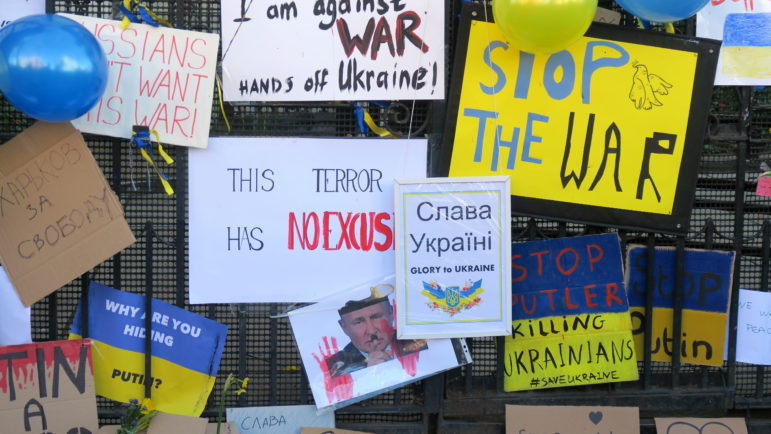TWH – Twenty years ago, amendments inserted into the Russian Constitution by President Vladimir Putin through executive order specifies that Russian be the language of the “state forming people.” Russian lost that status after the dissolution of the Soviet Union in 1991.

Map of Slavic Languages (2008) – Image credit: Alokin at English Wikipedia – Transferred from en.wikipedia to Commons by Dorieo. – Public Domain, – Public Domain
Russian is the most geographically widespread of the Slavic languages and is spoken by about 150 million individuals as a native language and an additional 110 million speakers as an additionally learned language. Russian is an official language in Russia, of course, but also in Belarus, Kazakhstan, and Kyrgyzstan. It is a lingua franca throughout the Baltics, the Caucasus, Central Asia, and parts of Eastern Europe including Ukraine.
Russia, however, is a vast country composed of 68 republics. While Russian is the official language of the nation, the various republics are able to recognize state languages other than Russian regionally.
Even still there are over 100 minority languages within the Russian Federation. Crimean Tatar may now only have as few as several hundred speakers while languages such as a Bashkir, Chuvash, and Chechen each have over a million speakers. Tatar is the largest of the minority language with about 4.2 million speakers.
And there are even more highly local languages. Votic is an example of such a language and it is spoken in two villages in the Russian Oblast exclave. The language counts exclude, of course, languages of migrants such as English and German and those of neighbors like, of course, Ukrainian.
The war in Ukraine has again sparked some backlash against the Russian language. In 2012, there was a literal brawl in the Ukrainian Parliament over a bill that introduced Russian as an official language in some parts of the country.
In the West, there is a surging interest in Ukrainian and Slavic culture that has been long eclipsed by the Russian language and culture. In the Pagan community, there has certainly been increased attention to Ukrainian and Slavic magical practices, so much so that the recent “Sunflower seeds curse” by a woman to Russian soldiers has attracted major attention.
The Los Angeles Times reported that “Between late February and March 20, the number of users taking Ukrainian language courses on the popular language app Duolingo increased by 577%, according to the company, with Ukrainian moving from the 33rd most-popular language to 13th most-popular on the app.”

One person told The Guardian, “I want to speak with Ukrainians in Ukrainian to celebrate their culture, their liberty and the incredible courage with which they are now standing up in their own defense in the face of indescribable and unprovoked brutality.”
But elsewhere, Russian still seems to be a sort of language of celebrity. Recently, in a letter to “His Excellency Mr. Vladimir Putin, President of the Russian Federation” by President Ilham Aliyev of the Republic of Azerbaijan, lauded the relationship between their nations, “I sincerely congratulate you and in your person the friendly people of Russia on the significant anniversary – the 30th anniversary of the establishment of diplomatic relations between the Republic of Azerbaijan and the Russian Federation.”
President Aliyev added described their cooperation on cultural relations adding that the “Russian-language education in Azerbaijani schools and universities confirm the importance we attach to the humanitarian agenda of our partnership.”
Many Azeris were less impressed, some because of overcrowding, others with the use of Russian over Azerbaijani. One person responded with an image of a naked man longingly hugging a ball and chain. Others called for a diminution of students learning Russian going as far as saying that the parents of children sent to learn Russian be labeled as traitors.
More recently, and sparking a greater controversy throughout Russian-speaking territory is the presence of pro-Russian propaganda sparked from the information war that Putin is trying to control.
As Putin tries to dominate the narrative about the Russian invasion of Ukraine and unfold with it falsehoods about the reasons for the war, speakers of minority languages have turned to them to share information and avoid Russian censorship. Putin has also been accused of using troops from ethnic minorities to wage the war in order to minimize Russian casualties.
The Independent notes, “A separate analysis of posts on the Telegram social media platform announcing the death or capture of more than 100 Russian servicemen found that just over 30 percent were non-Slav Russians, with many having Muslim names.”
At the same time, Russia has also generally ignored ethnic languages as inferior, never quite reaching importance and being dismissive of them collectively.

Signs outside the Russian Embassy in London protesting Russia’s war on Ukraine – Image credit: Kwh1050 – CC BY-SA 4.0
Having witnessed the suppression of Marina Ovsyannikova of Channel One who held an anti-war banner during a state-run newscast to show the reality of the Russian invasion, the strategy of using many ethnic minorities within the Russian incursion force may have come home to roost.
Some minority languages communities have started posting on social media as well as print artwork and t-shirts to share a single message: “no to war,” sometimes more specifically as “no to Putin’s war.”
The New Statesman reported that, “The idea seemed to come to everyone at the same time,” says Sonya Ahn, founder of the magazine Agasshin. Created as a beauty zine serving Russians of colour, it is now publishing a series of anti-war posters in minority languages such as Udmurt and Komi.
“In the second week of the war, I started seeing anti-war posters in [minority languages like] Buryat and Kalmyk on Instagram,” says Ahn. “At first, it really was about finding a safe way to express your opposition.”
The Wild Hunt is not responsible for links to external content.
To join a conversation on this post:
Visit our The Wild Hunt subreddit! Point your favorite browser to https://www.reddit.com/r/The_Wild_Hunt_News/, then click “JOIN”. Make sure to click the bell, too, to be notified of new articles posted to our subreddit.